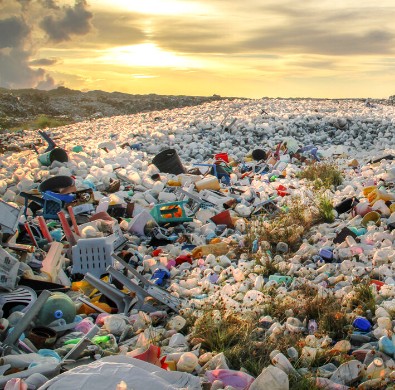The Waste Hierarchy - how reduce your waste at home
-rik8wo.png)
Recycling alone is not a solution for the over-production of waste and the over-consumption of resources that are so harmful to our planet.
The waste hierarchy pyramid is a guiding set of principles that can help us control our waste habits at home.
The 5 layers of the pyramid help us visualize which waste management methods are the best, beginning with "refuse" as the most Earth-friendly and ending with "rot" as the least.
1. Refuse
Refusing means that if you are offered an item that you don't want or don't need, you should refuse it.
- Know you'll never use that free gift with purchase? Refuse it!
- You can refuse a straw when you order a drink by simply saying "no straw please."
- Only have a few items at the check out? Refuse that bag, or better yet, bring your own.

- Your bank is handing out baseball-helmet-shaped bowls, but, literally, who needs one of those? Refuse it!
2. reduce
You can reduce your waste by choosing products that are designed with sustainability in mind.

Reusable options may take a bit more effort to use, but they divert tons of waste from the landfill every year. There are many local and online retailers that can help you choose products with reduction in mind. "Zero waste," "package free," and "reusable" are great keywords to use for when searching for these options online.
3. reuse
Reuse is when a product is used again and again.
If you keep the same clothing from year to year then, congratulations, you are already reusing! Reuse means continuing to use what you have instead of buying new.
"Repair" is sometimes included in the waste hierarchy, and it plays an important role in reuse. For example, if your child's favorite jeans have a hole in them, repair them for reuse!

There are many reusables on the market that can replace disposables in your home.
For example, a sturdy set of tupperware can replace aluminum foil, plastic wrap, plastic baggies, and other single-use containers.
Just imagine how many sandwich and snack baggies you can keep out of the trash if you send your child to school with reusable containers instead!
-c7oc8a.png)
Likewise, you can reuse items by choosing to shop second-hand. Not only is second-hand shopping fun and a great bargain, but there are now online thrift shopping options that make it easier than ever!
At its core, to reuse is to reduce. Instead of buying new, reusing avoids the energy consumption and emissions associated with the creation and transportation of new products.
4. recycle
Recycling is the process that occurs when spent packaging and items are collected, sorted, baled, shredded, processed, and remanufactured as new products.
Recycling is a sustainable solution to excess waste because it conserves resources. Not only does recycling conserve physical resources, such as oil and ore, but it also eliminates the emissions associated with mining and processing virgin (new) materials.

close the loop - buy recycled!

By buying recycled, you are sending a message to producers about what kind of products you would like to buy. This kind of conscientious consumerism will spur other companies to use recycled materials in order to gain your business.
5. rot
Rot is the last stop on any material's journey.
Rot does not necessarily mean that the material is organic and can "rot" in the traditional sense, but it means that the material is permanently condemned to the Earth.
A landfill is the most common place that materials are left to "rot."

A landfill is a large, lined pit in the ground where communities store their solid waste. Landfills are an essential part of solid waste management, but it is always preferable to divert materials from entering a landfill; this is because once they are committed to a landfill, materials are of no use to anyone, ever again!
Landfills, while necessary, can have some pretty nasty consequences. Landfills can be smelly, leak toxic liquids into the ground, and release green house gasses into the air. The more waste that is diverted from landfills, the fewer landfills we will need, and that is always best!
If you cannot refuse, reduce, reuse, or recycle something, only then should you let it rot.
By Eve Carey